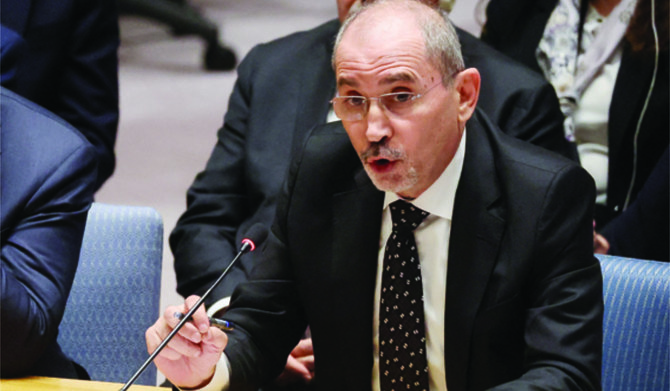DOHA: Jordan’s Foreign Minister Ayman Safadi on Sunday said that Israel was implementing a policy of pushing Palestinians out of Gaza through a war that he said meets the “legal definition of genocide.”
Safadi, whose country borders the West Bank and absorbed the bulk of Palestinians after the creation of Israel in 1948, also said that Israel had created hatred that would haunt the region and define generations to come.
“What we are seeing in Gaza is not just simply the killing of innocent people and the destruction of their livelihoods (by Israel) but a systematic effort to empty Gaza of its people,” Safadi said at a conference in Doha.
“We have not seen the world yet come to the place we should come to ... an unequivocal demand for ending this war, a war that is within the legal definition of genocide.”
FASTFACT
Foreign Minister Ayman Safadi argued that Israel’s avowed goal of destroying Hamas was belied by the extent of destruction among Gaza civilians, which he described as indiscriminate.
Safadi argued that Israel’s avowed goal of destroying Hamas was belied by the extent of destruction among Gaza civilians, which he described as indiscriminate.
Safadi also said that major differences had surfaced in talks between a delegation of Arab ministers and US Secretary of State Antony Blinken in Washington last Friday over the US administration’s military support for Israel and its refusal to call for a ceasefire.
Hamas has warned that no hostages would leave Gaza alive unless its demands for prisoner releases are met
Hamas said on Sunday that Israel had launched “very violent raids” targeting the biggest southern city of Khan Younis and the road linking it to Rafah near the border with Egypt.
“Neither the fascist enemy and its arrogant leadership ... nor its supporters ... can take their prisoners alive without an exchange and negotiation and meeting the demands of the resistance,” Hamas spokesman Abu Obeida said in a televised broadcast.
There are still 137 hostages held in Gaza, according to Israel. Activists say around 7,000 Palestinians are detained in Israeli jails, and senior Hamas official Bassem Neim said in late November that the movement was “ready to release all soldiers in exchange for all our prisoners.”
On Sunday, a source close to Hamas and Islamic Jihad told AFP both groups were engaged in “fierce clashes” with Israeli forces near Khan Yunis, where an AFP journalist also reported heavy strikes, as well as Jabalia and Gaza City’s Shejaiya district in the north.
Prime Minister Benjamin Netanyahu said Israel would continue its “just war to eliminate” Hamas, while army chief Herzi Halevi urged his forces to “press harder” in their offensive.
The army said it struck more than 250 targets in 24 hours, it said Sunday, including “a Hamas military communications site” and “underground tunnel shafts” in southern Gaza, as well as a Hamas military command center in Shejaiya.
Hundreds of Israelis rallied for the hostages in Tel Aviv, holding placards reading “bring them home now” and “they trust us to get them out of hell.”




















